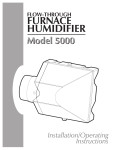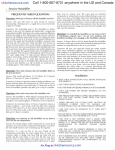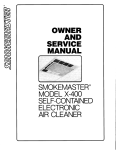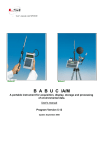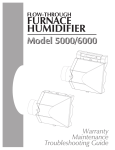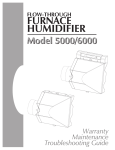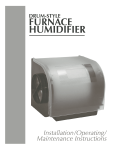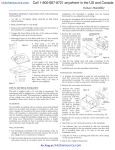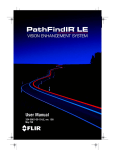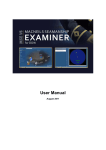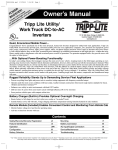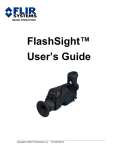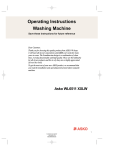Download Air King 6000 Operating instructions
Transcript
FLOW-THROUGH FURNACE HUMIDIFIER Model 6000 Installation/Operating Instructions 2 Model 6000 Flow Through Humidifier FREQUENTLY ASKED QUESTIONS ANSWER: This model will deliver 12 US Gallons (10 Imp. Gallons, 45.5 Litres) per 24 hrs of operation.. QUESTION: Why use a Flow Through Style Humidifier rather than a Drum Style humidifier? COMMENT: 24 Hrs of operation means continues humidifier operation. This unit delivers sufficient moisture to humidify the average home up to 3200 sq ft. The humidifier will ensure that when your furnace is heating it is delivering humidified air to your home. ANSWER: This will depend on several factors including size of home, type of furnace, and size of ducting; as well as personal preference. However in order to use this model flow through you will require at least 10" wide ducting where as our drum styles will fit on 8" wide ducting. COMMENT: Flow Through and Rotating Drum Style Evaporative Furnace Humidifiers will safely and efficiently humidify 90% of homes which use forced air heating. As a manufacturer of both styles there are pro’s and con’s to be considered when choosing a Flow Through or Drum Style. A drum style humidifier will typically have a higher output when compared to a flow through of equal size, however with today’s modern home construction and insulation techniques the higher capacities are not required, over humidification is something that should be well guarded against. Another point to consider is the fact that a drum style humidifier is 100% efficient (meaning that all the water supplied to the unit is delivered to the air) where as the flow through styles range anywhere from 30% to 40% efficient (meaning that for every gallon of water delivered to the air 2 gallons will be allowed to flow through). Today, Indoor Air Quality (IAQ) is an issue on everybody’s mind and the inefficiency of flow through humidifiers is by design as the water flowing through serves to flush away any unwanted minerals and such leaving only clean water to be evaporated. The cost of maintaining (typically a evaporator pad once a year) and operating a flow through style is far less when compared to the cost of maintaining a drum style humidifier to ensure healthy and efficient operation. QUESTION: What type of furnaces will this humidifier work on? ANSWER: The unit will work on most forced air furnaces which incorporates a heating source, a supply duct, and a return duct. COMMENT: The technology used in this humidifier to deliver water to the air is not new, it is the simplest and easiest style a Bypass type evaporative humidifier. Your furnace fan creates a pressure difference between the supply (hot) air and the return (cold) air. By installing a bypass tube between the supply and return air a small amount of air is forced (via the pressure difference)to flow from the supply duct through the humidifier’s evaporator pad and back into the return duct where it will mix with all the return air from your home. As the hot air passes through the evaporator pad it will “evaporator” moisture and deliver it to your home. What will differ from furnace to furnace or home to home is how much moisture or capacity you will get from the unit. There are many factors which will affect this, How old is your home? How old is your furnace? How well insulated is your home? For example, the capacity of the unit is 12 US gallons per 24 hours of operation, This is based on ARI standards (120°F hot air temp, 60°F water supply temp, 0.5" static pressure difference between Supply and Return) used by all humidifier manufacturers. If your furnace is a hi efficiency or pulse type furnace the hot air temperature may be less or the length of time the furnace burner is on may be less; therefore as a rule of thumb we would say you would get approx 75% to 80% of the rated output. Generally speaking High Efficient furnaces are used in homes which are very well insulated and therefore the 75% or 80% capacity will be more than enough to humidify the home. QUESTION: How much moisture does the humidifier deliver to the air in my home? QUESTION: How much water does this humidifier use? ANSWER: This humidifier incorporates a restrictor which meters the amount of water supplied to the unit. In a average home the unit will use 37 US Gallons (31 Imp. Gallons, 140 Litres) per 24 hrs of operation. COMMENT: Your furnace will not run continuously 24 hrs a day – in an average home the 36 gallons will be used over a 3 day period. QUESTION: I’m replacing an old humidifier on my furnace can I use the old components? ANSWER: You should replace all the components to ensure good operation. You may be able to utilize the existing duct cut outs for the new installation (see section in the instructions.) COMMENT: .As a rule we like to see you change all the components, particularly the water supply tube, as over time minerals, solids, or sludge may have built up, these will very quickly clog the water inlet of the flow through, or over time the tube may have become worn or leaky. Replace the Bypass duct as well there may be secondary dampers unseen which will block air or again there may be unseen wear which will cause air leaks. Same with electrical components or wiring these may be malfunctioning or worn out – If you have a humidifier which was interlocked with your furnace (meaning the humidifier only came on when the furnace came on) then the old transformer is getting power from the internal furnace wiring – You should leave this transformer and wiring in place – if this transformer is functioning and it is 24 Volts AC you may be able to utilize it to control the new humidifier. QUESTION: I’ve installed the humidifier on my furnace and it is functioning properly but I do not feel anything and the humidistat reading is not changing, is the humidifier working? ANSWER: As long as there is Hot Air going through the humidifier and there is water getting to the evaporator pad moisture is being delivered to the air in your home. COMMENT: All year, and especially during the winter months when many combustion appliances are operating in your home, fresh air is required to ensure a healthy environment for your family. Do not think of your home as a sealed bubble, no matter how well insulated. All houses breath (some more than others) the cold outside air mixes with the air in your home constantly, even when your furnace is not running. A furnace humidifier will work to offset the constant affect the dry outside air has on your home, and your home’s furnishings. Throughout the winter there is a constant diminishing and replenishing of moisture levels in the home, conditions inside and out rarely remain stagnant for any length of time. Model 6000 Flow Through Humidifier 3 INSTALLATION AND OPERATING INSTRUCTIONS: MODEL 6000 FLOW THROUGH HUMIDIFIER • READ THESE INSTRUCTIONS FULLY BEFORE INSTALLING THIS HUMIDIFIER. SELECTION OF LOCATION TO MOUNT THE HUMIDIFIER • SAVE THESE INSTRUCTIONS FOR REFERENCE. • WHEN DRILLING OR CUTTING INTO DUCTING BE EXTREMELY CAREFUL NOT TO DAMAGE AIRCONDITIONING COILS OR OTHER FURNACE APPARATUS. • THIS UNIT MUST BE INSTALLED ON 10” WIDE DUCTING MINIMUM. • FOR THIS UNIT TO OPERATE PROPERLY YOUR FURNACE SHOULD ACHIEVE A HEATING TEMPERATURE OF AT LEAST 35°C IN ONE MINUTE – IF IT DOES NOT YOU MAY HAVE TO PURCHASE A PRESSURE ACTIVATION SWITCH (SOLD SEPARATE) • DO NOT INSTALL THIS UNIT WHERE EXTREME TEMPERATURES EXIST – ( BELOW 45°F – ABOVE 145°F). • THIS UNIT REQUIRES A DRAIN TO ALLOW WATER TO FREELY RUN OFF. • FOR THIS UNIT TO OPERATE PROPERLY IT MUST BE INSTALLED ON A FORCED AIR HEATING SYSTEM WITH A SUPPLY DUCT and A RETURN DUCT. • THE HUMIDIFIER BODY and THE BYPASS COLLAR DAMPER ARE TO BE INSTALLED ON DUCTING ONLY – UNDER NO CIRCUMSTANCES MOUNT EITHER COMPONENT TO THE FURNACE BODY. All bypass type furnace humidifiers rely on the pressure difference which exists between the Supply Duct (hot air) and the Return Duct (cold air) to create and air-flow through the humidifier’s evaporator pad. The air will ALWAYS flow from HOT (high pressure) to Cold (low pressure). Selecting the proper location, and installing the humidifier properly as intended by the manufacturer is imperative for the proper operation of the humidifier – See Illustrations below along with the brief explanations as to what is a good installation and what is not. • INSTALLATION TIP - Before starting fully plan out the installation. Check for the locations of the humidifier, bypass collar and damper, the length and type of ducting required, the water supply, the water drain, the electrical wiring, and a constant 120 volt outlet to plug in the transformer. This will ensure your installation goes as easy and quickly as possible. IDEAL INSTALLATION Figure 1 SUPPLY DUCT WARM AIR RETURN DUCT COLD AIR 10" wide duct minimum Damper fully open No more than 30" • ELECTRICAL WIRING, WATER SUPPLY and DRAIN TUBE MUST NOT KINK OR COME INTO CONTACT WITH SHARP EDGES OR HOT SURFACES. Bypass collar and unit level • IF REPLACING AN EXISTING FURNACE HUMIDIFIER, WE RECOMMEND YOU REPLACE ALL COMPONENTS TO ENSURE PROPER HUMIDIFIER OPERATION. Bypass tube pulled tight and cut to length • THE INSTALLATION OF THIS PRODUCT MUST COMPLY WITH NATIONAL AND LOCAL ELECTRICAL, PLUMBING, BUILDING, AND MECHANICAL CODES. Water flowing to drain REQUIRED TOOLS • • • • • • • • • • • • • • • Safety Glasses Work Gloves Electric drill Drill Bits (3/8", 1/8", 5/64") Tin Snips Full size Philips or Roberstons screw driver Short handle Philips or Roberstons screw driver Adjustable wrench Utility Knife Pliers Level Measuring Tape or Ruler Medium Grit Sand Paper Pencil Tape 1. The humidifier body and bypass tube are installed at eye level, easily accessible for installation and routine maintenance. 2. The space between the humidifier body and bypass tube are no more than 30" to ensure maximum air flow through the humidifier. 3. The aluminum flex. Bypass tube are cut to the proper length and pulled Tight to ensure maximum air flow. 4. The bypass damper is full open. 5. The humidifier mounted level on the duct. 6. There is nothing inside the duct behind the bypass collar and damper or the humidifier body. 7. The humidifier and bypass collar and damper are level. 4 Model 6000 Flow Through Humidifier BAD INSTALLATION BAD INSTALLATION Figure 2 SUPPLY DUCT WARM AIR Figure 4 RETURN DUCT COLD AIR SUPPLY DUCT WARM AIR Bypass damper not open RETURN DUCT COLD AIR Air conditioning A-frame blocking the air flow Unit installed too low Unit draining to a bucket 1. The humidifier body is installed too low and will be difficult to work on. 2. The humidifier body and bypass collar and damper are not level, This will restrict air-flow through the humidifier as well as create uneven air-flow over the evaporator pad and activating sensor. 3. The bypass damper is not fully open, This will restrict air flow through the humidifier and reduce output. 4. The humidifier is being drained to a bucket rather than a proper drain, this will result in damage to the home. BAD INSTALLATION Figure 3 SUPPLY DUCT WARM AIR RETURN DUCT COLD AIR Bypass collar and humidifier not parallel 1. The bypass collar and damper are installed in front of the furnace’s air-conditioning coils – This will not only greatly affect the performance of the humidifier and cause malfunctions in the activating sensors, the homeowner risked damaging the air-conditioning coils – This would also be the case if the humidifier were installed in front of the airconditioning coils. • INSTALLATION TIP: In this type of installation the installer should mount the bypass collar and damper at least 6" above the air-conditioning coils and use hard metal ducting and elbows (sold separately) rather than the flex tube. While the humidifier and bypass Collar and damper will not be level the use of hard ducting rather than the flex ducting will make up for any restrictions or turbulence which would occur in aluminum flex tube. BAD INSTALLATION Figure 5 SUPPLY DUCT WARM AIR RETURN DUCT COLD AIR Bypass tube and humidifier installed on the same duct Sagging bypass tube 1. The humidifier body and bypass collar and damper are not level, this will restrict air flow through the humidifier as well as create uneven air-flow over the evaporator pad and activating sensors. 2. The Aluminum Flex bypass tube is not cut to length and is sagging, this will result in reduced air-flow over the evaporator pad and will affect the performance of the activating sensors. 1. The bypass collar and damper and the humidifier body are installed on the same ducting. This unit will not operate at all, there will be no air-flow through the unit, the air pressure will just equalize. This will be the case if both components are mounted on the return or on the supply duct. Model 6000 Flow Through Humidifier BAD INSTALLATION Figure 6 SUPPLY DUCT WARM AIR 5 PREPARING THE HUMIDIFIER FOR INSTALLATION RETURN DUCT COLD AIR Bypass required is more than 30" and installer is using flex tube Model 6000 humidifiers must be mounted on the return (cold air) duct only. Always ensure that wiring, water supply tube, and water drainage tube do not come into contact with hot surfaces or sharp edges. Replace any component at the first sign of wear. Unit is not level CAUTION: When cutting or drilling into ducting take care not to damage any air-conditioning coils or other furnace apparatus CAUTION: Wear safety glasses and work gloves when installing this unit; sharp metal edges can cause severe injury. Bypass collar and humidifier not parallel CAUTION: Turn the furnace off before starting this installation. STEP #1: RIGHT HAND DUCTING OR LEFT HAND DUCTING 1. The humidifier body is not mounted level on the duct, the water which flows to the distribution tray and through the evaporator pad will all run down one side of the evaporator pad. 2. The bypass collar and tube and humidifier body are not mounted level, this will restrict air flow through the humidifier as well as create uneven air-flow over the evaporator pad and activating sensors. 3. The bypass tube used is well over the 36" supplied, the flex tube is not pulled tight and the most direct route to the opposite duct was not taken, this will restrict air flow through the humidifier as well as create uneven air-flow over the evaporator pad and activating sensors • INSTALLATION TIP: In this type of installation the installer should have mounted the bypass collar and damper in the most convenient location to run ducting back to the unit - If for some reason it was necessary to run ducting like this, hard metal ducting and elbows (sold separately) rather than the flex tube should be used; As well the installer should try to find the most direct route to duct. While the humidifier and bypass Collar and damper may be more than the recommended 30" apart the use of hard ducting rather than the flex ducting will make up for any restrictions or turbulence which would occur in aluminum flex tube. – Flexible ducting may be the most convenient for installation purposes however when it comes to air-flow it is highly restrictive,(see fig 7.) its use should be kept to a minimum and when used it should be pulled as tight as possible. Depending on your furnace, or for the convenience of your installation it may be necessary to convert the humidifier from right hand ducting or left handing ducting. Follow the steps below to switch the side which the bypass duct will attach to the unit. SWITCH THE DUCTING ONLY IF YOUR APPLICATION REQUIRES IT. 1. Remove the humidifier front cover – secured in place with a 10-24 plastic thumb screw at the bottom of the cover. Tilt the cover away from the body slightly (approx. 1/2") and then lift up the cover to free the hooks at the top of the unit. 2. Remove all loose components packaged inside and any packaging. With a firm pull, disconnect the water tube from the water nozzle and remove the evaporator pad assembly by sliding it toward the top of the humidifier, then lifting it out. (fig 8.) Figure 8 3. Remove the Digital Humidistat Top Console by removing the 2 screws which hold it in place. (fig. 9). TAKE CARE NOT TO DAMAGE THE HUMIDISTAT SENSOR AT THE END OF THE WIRE EXITING THE BACK OF THE DIGITAL HUMIDISTAT TOP CONSOLE. Figure 9 FLEX LOOSE EQUIVALENT LENGTH = 9 FEET FLEX PULLED TIGHT EQUIVALENT LENGTH = 2 1/2 FEET Figure 7 HARD DUCTING ELBOW (90°) EQUIVALENT LENGTH = 10 FEET FLEX DUCTING ELBOW (90°) EQUIVALENT LENGTH = 30 FEET 6 Model 6000 Flow Through Humidifier 4. Gently re-direct the two red wires exiting the right hand side of the digital humidistat top console so that they exit the top console from the left hand side, same side as the two black wires (fig. 10) Figure 10 5. Taking care not to pinch any wires and ensuring that the humidistat sensor wire exits the digital humidistat top console from the “T” slot on the back of the console, replace the humidistat console onto the top of the humidistat cabinet, and secure it in place using the two screws removed in step 4. STEP #2: MOUNTING THE HUMIDIFIER ON THE DUCT If you have not already done so remove the humidifier cover – secured in place with a 10-24 plastic thumb screw at the bottom of the cover. Tilt the cover away from the body slightly (approx. 1/2") and then lift up the cover to free the hooks at the top of the unit. Remove all loose components packaged inside and any packaging. With a firm pull, disconnect the water tube from the water nozzle and remove the evaporator pad assembly by sliding it toward the top of the humidifier, then lifting it out. (fig 8.) – The humidifier comes humidifier mounting template – Ensure the cabinet is installed level for proper operation. Before mounting the Model 6000 humidifier cabinet onto the duct furnace duct, the humidistat sensor, located at the end of the wire exiting from the “T” shaped slot on the back of the humidifier, must be secured in place. This is done be gently tucking the wire into the “T” slot, hooking the larger tab on the sensor housing into the top of the “T” slot and firmly bringing down the sensor housing until the smaller tabs on the sensor housing snap into the sides of the “T” slot (see fig. 13) Figure 13 6. Remove the 2 - #6 screws which hold the humidifier side in place (a short handled screw driver will give you easier access to the screws) (fig 11.) Figure 11 CAUTION: When cutting or drilling into ducting take care not to damage any air-conditioning coils or other furnace apparatus CAUTION: Wear safety glasses and work gloves when installing this unit. Sharp metal edges can cause severe injury. 1. Use adhesive tape to affix the template onto the duct in the selected location. Use the level line to the template and a level to ensure the cabinet will be level. 2. Drill the 4 marked cabinet mounting holes on the template using a 1/8" drill bit (not supplied) 7. Lift the humidifier side out of the right hand position, turn the part and position it on the other side of the humidifier. (fig. 12) Figure 12 3. Using a 3/8" drill bit (not supplied) drill a hole inside the rectangle marked “HUMIDIFIER CUT OUT”. 4. Using the 3/8" hole drilled in step 3 as a starting point cut out the Humidifier Cut Out area marked on the template using tin snips (not supplied). Cut on the outside of the line to ensure a proper fit. 5. Mount the humidifier cabinet on the duct with 4 of the screws from the installation package. Level the humidifier before tightening the screws. (fig. 14) 8. Use the 2 screw removed in step 3 to secure the humidifier side in the left hand side. Model 6000 Flow Through Humidifier Figure 14 6. Install the evaporator pad assembly by hooking the slanted tabs on the Evaporator Pad Frame onto the tabs on the back of the humidifier cabinet. MAKE SURE THE OPEN END OF THE NOZZLE IS FACING YOU. 7. Firmly insert the water tube into the nozzle. STEP #3: MOUNTING THE BYPASS COLLAR AND DAMPER The humidifier comes with a Collar and Damper mounting template – If possible ensure that the bypass collar will be level to the humidifier duct connection. As well try to keep the bypass collar within 30" of the humidifier. 7 8. Ensure the bypass is pulled tight and that any ripples are kept to a minimum and no sagging is occurring, Cut any excess bypass tube off if necessary using tin snips (not supplied). • INSTALLATION TIP: If replacing an existing humidifier which has been installed on your furnace you maybe able use the existing cut outs, however replace the components, bypass collar and damper and bypass tubing. The majority of furnace humidifiers used 6" ducting for bypass. The cutout for the humidifier will, more than likely be different – If replacing a drum style the cutout will not be big enough, and if replacing an old flow through you may have to first install a separate metal plate (not supplied) to cover the existing hole as it may be too big – Before you mount the separate metal plate (not supplied) attach the humidifier cabinet template to it and drill all necessary holes and make the required cutouts. Keep in mind the points listed above about length and level of ducting – it maybe best to cover all existing holes and start fresh. STEP #4: WATER SUPPLY AND DRAINAGE CONNECTION WARNING: Make sure the evaporator pad is installed correctly BEFORE you make the water connections. 1. SAND BOTH ENDS (fig 16) of the water supply tube. FAILURE TO DO SO MAY RESULT IN LEAKS. Figure 16 CAUTION: When cutting or drilling into ducting take care not to damage any air-conditioning coils or other furnace apparatus CAUTION: Wear safety glasses and work gloves when installing this unit – Sharp metal edges can cause severe injury. 1. Use adhesive tape to affix the bypass template onto the duct in the selected area. 2. Drill 3 marked bypass collar mounting holes on the template using a 1/8" drill bit (not supplied) 2. Prepare the end (fig 17) of the 1/4" tubing for water connection to the humidifier (All required hardware supplied in the Saddle Valve Kit in the installation package). Brass nut 3. Using a 3/8" drill by (not supplied) drill a hole inside the circular area marked Collar Cut Out. 4. Using the 3/8" hole drilled in step 3 as a starting point cut out the Collar Cut Out area marked on the template using tin snips (not supplied) 5. Mount the bypass collar and damper (fig. 15) using the remaining 3 screws from the installation package. The air damper should be mounted in the open position. The top screw secures the damper. Figure 15 6. Slide one of the 6" spring clamps supplied over one end of the bypass tube. Slide this same end of the bypass tube over the flange of the collar and secure it with the spring clamp. 7. Slide the other 6" spring clamp over the other end of the bypass tube. Slide this end of the bypass tube onto the humidifier and secure it with the spring clamp. Figure 17 Plastic ferroule Brass insert Plastic water tube 3. Make the tube connection to the humidifier using an adjustable wrench (not supplied) to tighten the nut. (fig 18) Figure 18 8 Model 6000 Flow Through Humidifier 4. Select the most convenient location for connecting the self piercing needle valve, On a cold water pipe. Connect the needle valve as shown (fig 19), the hardware shown is supplied in the needle valve kit. Once the the valve is connected to a pipe as shown, TURN THE VALVE CLOSED ALL THE WAY, and then open so water can flow to the humidifier. Check all fittings for leaks and tighten/repair if necessary. 1. Make sure all water connections are secure and do not leak. Also, ensure that all components are secure and installed correctly. 2. Plug in the 24 Volt transformer into a constant 120 Volt power source (an outlet which cannot be shut off via a wall switch). Turn on the humidifier by depressing the main red ON/OFF button – When the unit is powered the main green LED on the Digital Humidistat Top Console will turn ON. (fig. 22) Figure 19 Brass insert Plastic ferroule Brass nut Figure 22 Plastic water tube 5. YOU MUST RUN A DRAINAGE TUBE FROM THIS UNIT. Select a convenient location for running the 1/4" drainage tube, 15 ft supplied. Before you connect the tubing to the drain fitting on the bottom of the unit, slip the 1/4" hose clamp (supplied) over the tubing (fig 20). Push the tubing over the fitting and secure in place with the hose clamp. CAUTION: Drain tubing must not kink or come into contact with sharp edges or hot surfaces. STEP #5: ELECTRICAL INSTALLATION Model 6000 humidifier is equipped with a digital humidistat built into the humidifier. This humidistat monitors the relative humidity level of the air in your home. Figure 20 Main Power Green LED 1. Locate the humidifier terminal panel on the side of the humidifier cabinet, behind the bypass tube. Connect the two red wires from the Digital Humidistat Top Console to the two terminals marked “24 VAC IN” (fig 21). It does not matter which wire is connected to which terminal. Figure 21 2. Locate the two black wires from the Digital Humidistat Top Console, connect these wires to the two wires from the 24 Volt plug in transformer. 3. Use the insulated staples included with your installation package to secure any loose wiring. STEP #6: TESTING THE INSTALLATION If you have not already replace the front cover of the humidifier and secure in place using the plastic thumb screw. 3. Set the digital humidistat to a setting of 50% + , This ensures the humidistat is calling for humidity – If the digital humidistat is not calling for humidity at the BEGINNING of the furnace cycle the humidifier will not turn on, if you turn up the digital humidistat in the middle of the furnace cycle the humidifier will wait until the NEXT cycle to turn on. SEE SECTION SETTING and OPERATING THE DIGITAL HUMIDISTAT. 4. Turn on the power to your furnace and turn up the thermostat so that the furnace cycles on in heating mode. • OPERATING TIP: Most furnaces will take a few minutes to allow heat to build up before the furnace fan will run – The “HUMIDISENSE” control contained in the humidifier will wait until it senses your furnace fan blowing hot air. If only your furnace fan is running the unit should not turn on. The “HUMIDISENSE” will not turn the humidifier on until is senses a temperature rise of 4°C and the air temperature is over 30°C. This ensures the efficient use of water. 5. Depending on your furnace type the unit should turn on within approx 60 seconds of the furnace entering the HEATING cycle. You will know because the green “HUMIDISENSE” LED on the front of unit will turn on (fig 23.) – If the unit does not turn on refer to the trouble shooting section in the Maintenance Guide. Figure 23 Green Humidisense LED Model 6000 Flow Through Humidifier 6. Once the unit has been running for approx 3-4 minutes you will see a small amount of water trickling out of the drain tube. If the unit has turned on and the green light is on but no water is trickling refer to the trouble shooting section in the Maintenance Guide. 9 Dip Switch • OPERATING TIP: In order to ensure efficient water use, ensure water will not blow off the evaporator, and to protect the humidifier’s solenoid valve there is an orifice fitting installed on the inlet of the solenoid valve. This fitting restricts the amount of water flowing to the unit, which will vary depending on your house’s water pressure – On average this fitting will allow approx 300-600 ml of water to flow in 5 minutes of humidifier operation. 7. After about 5 minutes of running turn your thermostat down so the furnace cycles off. IT IS IMPORTANT TO ALLOW THE FURNACE TO CYCLE OFF VIA THE THERMOSTAT AND NOT THE MAIN FURNACE SWITCH – AS ALL FURNACES WILL RUN A COOL DOWN TO ALLOW HEAT TO CIRCULATE OUT OF THE FURNACE HEATING CHAMBER. The Humidifier will sense the temperature drop and shut off (this will occur depending on your furnace, from 60 seconds before the furnace shuts of to 60 seconds after the furnace shuts off.) You will know the humidifier has shut off because the green “HUMIDISENSE” LED on the front of the humidifier will shut off. (fig. 23) – The off cycle of the “HUMIDISENSE” CONTROL IS ADJUSTABLE – See section “CUSTOMIZING HUMIDISENSE TO YOUR FURNACE” below if the humidifier does not shut off with your furnace. • OPERATING TIP: Most furnaces will take anywhere from 30 seconds to 2 minutes to complete a off cycle. First the furnace will sense that the thermostat is satisfied then the furnace burner will shut off. The furnace fan will continue to run (the amount of time depending on how your furnace is set up) this allows the heat to circulate out of the furnace heating chamber and assures efficient use of heating fuel. YOU MUST CAREFULLY FOLLOW THE FOLLOWING STEPS TO CHANGE THE CONTROL’S SET POINT: 1. Determine if the humidifier is not shutting off when the furnace shuts off 2. Read the explanation of the different settings below and determine which dip switch position you require. 3. The humidifier must be energized but NOT running in order to change the dip switch position. If your humidifier has not shut off after a furnace cycle, turn DOWN the furnace’s thermostat (so the furnace shuts off and will not come back on). UNPLUG the humidifier for a few minutes and allow the humidifier to cool down, then plug the humidifier back in. Now the humidifier should be plugged IN, the humidistat turned UP all the way, your furnace should be OFF, and the humidifier should NOT be running. 4. With the furnace OFF, Change the dip switch position to the desired location. 5. AFTER you have changed the dip switch location UNPLUG THE HUMIDIFIER FOR 1 MINUTE. HUMIDIFIER OPERATION CUSTOMIZING HUMIDISENSE TO YOUR FURNACE The HUMIDISENSE control is a temperature and time based control designed to cycle the humidifier ON and OFF in sequence with your furnace’s cycles. As there are many different homes and styles of furnaces the HUMIDISENSE control has 4 self contained adjustable temperature set points to control the humidifier’s cycles, as well there is a redundant safety circuit which with the use of a pressure switch (sold separately) can be used to bypass the temperature control feature and cycle the humidifier based on the furnace fan’s cycle. Depending on your furnace or other factors present in your home (use of secondary supplemental heating, HVR’s, ERV’s, etc) it may become necessary to change the setting of the control to ensure the humidifier is shutting off when your furnace cycles off. This is easily done by changing the dip switch (located on the lower side of the control housing see below) positions, using a small screw driver. NOTE: Only change the setting IF REQUIRED. 6. After the humidifier has been unplugged for 1 MINUTE, Plug the humidifier back in and WAIT ANOTHER MINUTE. 7. The control set point has now been changed. Turn UP the furnace thermostat and check humidifier operation. HUMIDISENSE CONTROL SETTINGS: FACTORY SETTING (FIG. 25.) The control comes from the factory set with the criteria indicated below. Humidifier ON : A temperature rise of 4°C in one minute and a temperature greater than 30°C Figure 25 Humidifier OFF: A temperature drop of 2°C in one minute and a temperature less than 45°C • This setting will meet the requirement of 85% of the furnaces in the market today. It will provide the required humidifier control on furnaces ranging from high to low efficiency. You should only change the setting if required. 10 Model 6000 Flow Through Humidifier OPTIONAL SETTING # 1 (FIG. 26.) Humidifier ON: When pressure switch senses air-flow in the furnace duct Humidifier ON : A temperature rise of 4°C in one minute and a temperature greater than 30°C Humidifier OFF: A temperature drop of 2°C in one minute and a temperature less than 35°C • This setting will be useful when you find that the humidifier is shutting off too early or if the humidifier is cycling off in the middle of a furnace cycle. If your furnace is multi-speed (the furnace fan will change speed during the heating cycle.) or if you have a highefficiency furnace, where the furnace burner will cycle ON and OFF during the heating cycle in order to save energy. Figure 26 OPTIONAL SETTING # 2 (FIG. 27.) Humidifier ON : A temperature rise of 4°C in one minute and a temperature greater than 30°C Humidifier OFF: A temperature drop of 2°C in one minute and a temperature less than 55°C Humidifier OFF: When pressure switch senses no air-flow in the duct. • This setting can be used if for some reason the above 4 different control setting fail to shut off the humidifier. This is more than Figure 29 likely occurring as a result of a non-standard heating system, some sort of supplement heating, improper humidifier installation, improper furnace operation, or for some other unforeseen circumstance. This option may also be used if for some reason the humidifier will not turn on, this could be occurring because the furnace is not providing enough heat or it is not providing the required temperature rise fast enough. All four of the above control setting have the same ON temperature requirements. This is ensuring an efficient use of water as there is a minimum air temperature to efficiently evaporate water. As well if for some reason you wish to bypass the temperature feature and have the humidifier operate when fan operates you may choose this option. This option requires the purchase and installation of a separate pressure switch (fig 30). Installation instructions for the pressure switch are included with the kit. • This setting will be useful when you find the humidifier is not turning off when your furnace has cycled off. Typically this will occur because the furnace’s cool down cycle is short and the furnace is shutting off when there is still hot air circulating through the ducts. As well this will be seen when the furnace is located in an enclosed space and as a result the ambient temperature is high. Figure 27 OPTIONAL SETTING # 3 (FIG. 28.) Humidifier ON : A temperature rise of 4°C in one minute and a temperature greater than 30°C Humidifier OFF: A temperature drop of 2°C in one minute and a temperature less than 65°C • This setting will be used when option # 2 (55°C off temp) does not work. You will find this when a furnace does not have a cool down cycle at all, on older model furnaces. This could be occurring when the furnace is older and has short off cycles or if the furnace is located in a tight enclosed space and the ambient temperature is very high. Figure 28 • OPERATING TIP: Depending on the type of furnace and installation, you may notice that after the humidifier has shut off and the furnace shuts off the humidifier will turn back on. This is occurring because the control is sensing residual heat from the heat exchanger after the furnace has shut off. If you are experiencing this you should change the control setting until the problem is resolved. The temperature at which your furnace shuts off is too close to the control’s OFF temperature. It may be beneficial to have the control set to the higher OFF temperature (55°C or 65°C). However it is important to note ONLY CHANGE THE CONTROL SETTING IF NECESSARY. REDUNDANT SAFETY CIRCUIT SETTING – PRESSURE SWITCH CONTROL (NOT SUPPLIED) (FIG. 29) Figure 30 Pressure Switch SETTING AND OPERATING THE DIGITAL HUMIDISTAT CONTROL SPECIFICATIONS • Supply Voltage – 24 volts AC. • Output Voltage – 24 volts AC. • Set Point Range – 15% to 60% RH. • Display Range – 15% to 60% RH. • Resolution – 1% RH. • Accuracy - +/- 5% RH. The model 6000 digital humidistat control components include the following (fig 31) Model 6000 Flow Through Humidifier 11 number on the left of the display is the actual relative humidity being sensed. DIGITAL DISPLAY WHEN HUMIDIFIER HAS REACHED THE SET POINT (FIG 34) Figure 31 When the relative humidity being sensed raises above the set point the humidifier does not need to run and the control display will be similar to above – It will show two numbers and a pointing finger. The number displayed beside the pointing finger is the set point – The larger number on the left of the display is the actual relative humidity being sensed. Figure 32 Slanted Incremental Bar Figure 33 Figure 34 DIGITAL DISPLAY WHEN HUMIDIFIER IS HUMIDIFYING. (FIG 35) When the humidifier is adding moisture to air the display will change – In the top right of the display will be a number, this is the set point. - In the mid lower section of the display will be water droplets, this is indicating that the humidifier is adding moisture. - The remaining portion of the display will be taken up by a slanted incremental bar, This bar represents the percentage of the set point achieved. Figure 35 SLANTED INCREMENTAL BAR. 1. MAIN ON/OFF POWER BUTTON FOR THE HUMIDIFIER. – Use this button only when turning ON or OFF the humidifier. When humidifying the control will display the set point and a bar representing the percentage of set point achieved – each bar represent approximately 10% of the set point. Below are a few examples of humidifying displays showing a set point, an incremental bar, and what relative humidity they represent. 2. REDUCE RELATIVE HUMIDITY SET POINT BUTTON. – Use this button only when reducing the relative humidity set point. 3. INCREASE RELATIVE HUMIDITY SET POINT BUTTON. – Use this button only when increasing the relative humidity set point. 4. DIGITAL DISPLAY. – Displays (fig 32) a) User Set Point. b) Set Point Number Indication. c) Humidifier Operating Indication. d) Actual relative humidity being sensed. e) Incremental bar indicating relative humidity status as it relates to the set point. 5. MAIN POWER GREEN LED. – Indicates that the main power to the humidifier is ON. When power is first turned on to the humidifier the digital humidistat will display the default set point, which is 35%. You may change this setting by using the Increase or Decrease button on the control. If for some reason the power is lost to the humidifier (power outage or unit becomes unplugged) there is a delay (30 sec to 1 min) before the control loses it’s set point, however if power is lost for any length of time the control will revert to the default settings. If you notice that the control is consistently resetting to the set point this is an indication that, a) You have not wired (or plugged in the transformer) the transformer to a CONSTANT 120 volt supply (one which cannot be shut off via a switch) or b) The power connections (Two Black Wires) to the humidifier are loose. What is displayed will depend on what the set point is, what the relative humidity being sensed is, and if the set point is being changed. DIGITAL DISPLAY WHEN CHANGING THE HUMIDITY LEVEL (FIG 33) When you start to change the set point (raising or lowering) the display will change, showing two numbers and a pointing finger (the water droplets may be displayed as well depending on what the relative humidity status was before you started changing the set point). The number displayed beside the pointing finger is the set point and is the number you are changing – The larger 1. Set point 40% - 50% of bars showing - relative humidity 20% 2. Set point 45% - 80% of bars showing – relative humidity 36% 3. Set point 50% - 50% of bars showing – relative humidity 25% CONTROLLING THE HUMIDITY LEVEL AND HUMIDIFIER OPERATION HUMIDIFIER START UP. When you first plug in the 24 Volt transformer and turn on your humidifier you may hear a click. This is the power getting to the control’s relay – As well if you adjust the digital humidistat UP or DOWN and past the sensed humidity level you may hear the control’s relay clicking. This is normal as the humidistat is just an ON/OFF switch, every time the digital humidistat is turned DOWN the power is cut to the HUMIDISENSE control. When starting up the humidifier for operation: 1. Make sure the transformer is plugged in and the water supply is turned on. 2. Make sure main power to the humidifier is turned ON. 3. Turn the humidistat up high, so it is calling for humidity. 4. Turn your furnace thermostat UP so the furnace cycles ON. 5. Once the HUMIDISENSE control senses heat the humidifier will turn ON. You will know because the green “HUMIDISENSE” LED (fig. 23) on the front of the humidifier will turn ON. 6. After a few moments you should hear water trickling through the drain. 7. After your furnace has complete the heating cycle and shut off 12 Model 6000 Flow Through Humidifier (by the thermostat) the humidifier will cycle OFF – You will know because the green “HUMIDISENSE” LED (fig. 23) on the front of the humidifier will turn OFF. CONTROLLING THE HUMIDITY LEVEL The digital humidistat with this humidifier is to control the amount of moisture added to the air in your home – It will sense the relative humidity level in the air and work as an ON/OFF switch to control the humidifier, regardless of whether your furnace is on or not. At the beginning of the heating season it may take sometime to build up the relative humidity level in your home to the desired level – For the first few weeks turn the humidistat up high to ensure the humidifier will turn on with every furnace cycle – after you feel that you have achieved the desired relative humidity level turn the humidistat down until it cycles the humidifier OFF. The Humidifier will then work to maintain the relative humidity at that level. ACHIEVING AND MAINTAINING A HUMIDITY LEVEL Outside conditions are the primary factor affecting the humidity level in your home. The colder it gets outside the less moisture the outside air will have, your home brings in that outside air and the humidifier will work to add moisture to it. As outside conditions change the humidity level in your home will change as well. Other factors which will affect humidity levels in the home include, how many airchanges are occurring, the amount of people occupying the home, air leaks, the use of showers, exhaust fans, HRV’s, and the use of a fireplaces or wood stoves. For more information on achieving a humidity level and or maximizing the output of the humidifier please see the Maintenance and Trouble Shooting Guide. each reduction in setting allow 6 hours for equilibrium to be reached before readjustment. If condensation is consistently forming on your windows or if the relative humidity level being sensed by the digital humidistat is consistently different than the relative humidity level in the home then you may want to consider the use of a MODEL 6000 REMOTE HUMIDITY SENSOR KIT – This must be purchased separate (Parts and Service Line 1-800-465-7300) and will allow you to locate the humidity sensor somewhere in the living space. The remote sensor comes with 15 feet of wire and a remote sensor housing. Changing the digital humidistat is easily done and instructions for doing so come with the Remote Sensor Kit. If after moving the humidistat the condition persists turn OFF the water supply at the needle valve, turn the humidifier off and consult a qualified HVAC service person. When your house is unoccupied for longer than 3 days during the winter months always set the humidistat down to 15% so that severe weather during you absence will not result in condensation which might cause damage in your home. BYPASS AIR ADJUSTMENT, SUMMER SHUTDOWN, AND YEARLY MAINTENANCE BYPASS AIR ADJUSTMENT. Sometimes there can be a static pressure differential that may cause an excess of air to flow through the bypass tube, causing less airflow through the distant heat outlets in the house. It may also blow water off the evaporator bad. In either case the air damper installed with the bypass collar should by gradually closed until the condition is corrected. To close the damper loosen the top screw and lift up on the damper and turn closed to the desired position. Damper adjustment is another way of adjusting the amount of humidity being added to the house (the less air bypassed the less humidity will be added.) SUMMER SHUT DOWN SAFELY OPERATING A FURNACE HUMIDIFIER Proper control of the relative humidity level in the home is key to ensuring good IAQ (Indoor Air Quality) for your home as well as protecting against moisture damage. Although a relative humidity environment of 45 50% may be desirable, setting your humidistat at that point when outside air temperatures are below 30°F can cause condensation on windows and walls. Continued condensation for extended periods of time may result in structural damage. Use the chart below as a guide for maximum relative humidity settings at different outdoor air temperatures. OUT SIDE AIR TEMPERATURE MAXIMUM RELATIVE HUMIDITY SETTING -20°F /-30°C 15% -10°F /-25°C 20% 0°F / -20°C 25% +10°F/-10°C 30% +20°F/-5°C 35% ABOVE +20°F/0°C 40% If condensation continues to form on windows at these settings reduce the humidistat setting by successive 5% increments. After At the end of the heating season complete the following steps. 1. Turn the humidifier off. 2. Unplug the transformer. 3. Close off the water supply at the saddle valve. 4. Close the bypass damper. YEARLY MAINTENANCE AND WINTER START UP For detailed recommended maintenance schedule refer to the Maintenance and Trouble Shooting Guide. At the beginning of the heating season complete the following steps. 1. Inspect the water supply tube, Water drainage tube, and Electrical wiring replace if required 2. Plug in the transformer. 3. Turn on the humidifier. 4. Turn on the water supply at the saddle valve and check for any leaks. 5. Open the bypass damper. 6. Test the operation of the humidifier and check for any leaks and complete any necessary repairs.












